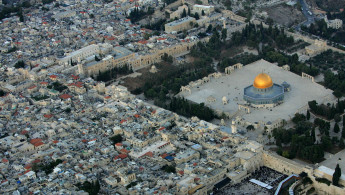Google's 'erasure of Palestine' puts lives at risk: report
In its report, 7amleh, which describes itself as a "non-profit organisation aimed at enabling the Palestinian and Arab civil society to effectively utilise the tools of digital advocacy through professional capacity building, defending digital rights and building influential digital media campaigns", has shown how what seems to be a simple leaning towards Israeli bias actually has a huge impact on Palestinians.
The report looked at four main aspects in which Google is complicit in erasing Palestine from the map: the erasure of Palestinian villages under Google Maps, the legal implications of Google's actions, the way route planning can put Palestinian lives in danger and the implication of the terminology Google uses.
There is a clear discrepancy of the visibility of Palestinian villages and Israeli villages on Google Maps, according to 7amleh.
Palestinian villages in the Naqab/Negev desert are made nearly invisible, unless they are being searched for by someone who already knows exactly where the village is, according to the report.
|
||
The villages are only visible when zoomed in very closely. Even then, they are refered to using the name of the clan inhabitants, rather than the name of the village itself, which is how Palestinians refer to villages. Israeli villages, however, are more clearly marked and recognised easily.
"Despite their small size, Israeli villages are displayed even when zoomed-out, while unrecognised Palestinian Bedouin villages, regardless of their size are only visible when zooming in very closely," the report said.
Nadim Nashif, co-founder of 7amleh, told The New Arab: "This is evidence that Google is clearly perpetuating the Israeli agenda of erasing Palestine from the map, which is very dangerous for Palestinian civilians and puts Palestine activism under threat.
"Ultimately, Google is one of the largest sharks for people to acquire information. They know this and they are using their power irresponsibly."
Because of this, both Israel and Google are defying the Geneva Conventions, according to 7amleh.
Destruction of Palestinians' property by the "Occupying Power" is prohibited by Article 53 of the Fourth Geneva Convention (1949) unless "absolutely necessary by military operations". This prohibition is routinely ignored. In the Naqab and Area C, Israeli authorities are using strategies to forcibly transfer the Bedouin communities, which are both direct, such as the enforcement of discriminatory legislation, and indirect, such as the constant threat of demolitions.
"The aim of these practices is to dispossess and expropriate Palestinian land," the report said.
"The failure of Google Maps to depict Palestinian villages on its maps suggests that their practices are politically influenced and biased in favour of Israel's systematic violation of the human rights of Palestinians."
Danger to Palestinian lives
As technology advances, online maps are crucial for instant and easy route planning. For Palestinians, however, using Google Maps could get them killed.
"The reason it's so dangerous for Palestinians using Google Maps is because the route planning is in the eyes of the settler," Nashif explained.
"Google Maps does not have an option for Palestinains who cannot enter illegal Israeli settlements. This not only erases the difficulties Palestinians face when trying to get from one place to another in the occupied lands, but poses a tangible threat to Palestinians."
From the archives: No, Google should not put 'Palestine' on its maps
Disappearing Palestinian statehood
The terminology that Google uses also plays a huge role in the visibility of a Palestinian state to its users - which has in the past caused outrage - according to the report.
"When the terms 'West Bank' and 'Gaza' disappeared from Google Maps in late 2016 and were replaced with the general term 'Israel', an uproar on social media ensued," the report said.
|
||
| Translation: Palestinian revolutionaries in Ain al-Helweh refugee camp burning photos of Yasser Arafat in protest of the signing of the Oslo Accords on 13/9/1993 |
"The hashtag #PalestineIsHere went viral and reaffirmed the existence of Palestine - a term that had never been used on Google Maps."
Other examples the report highlighted is the recognition of Jerusalem as Israel's capital, following US President Donald Trump's controversial decree and the erasure of Palestinian cities from maps.
Result of Oslo?
Whilst 7amleh told The New Arab that this was one of the effects of the Oslo Accords, which has tainted the legacy of former Palestinian leader Yasser Arafat, the organisation urges that Palestinians and Palestine solidarity activists must look to the future.
"Of course there's no way of denying that the reality we live in is a direct result of Oslo, but right now, we need to focus on making sure online companies recognise us and our plight," Nashif said.
"Digital activism is essential for Palestinains to reclaim their rights and for Palestinian statehood to be recognised and advocated for."

![sudan women [getty] sudan women [getty]](/sites/default/files/styles/image_330x185/public/media/images/5019D7F4-52AF-4377-8A05-885D27476479.jpg?h=d1cb525d&itok=tKXV7r-W)
